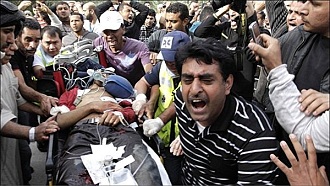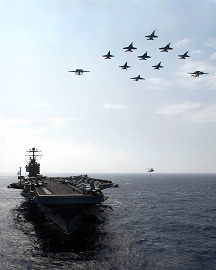Bahraini Unrest Stirs Unease in Washington
After months of ruling Al Khalifa family crackdowns against nonviolent protesters, political opponents, human rights activists, medical professionals, independent journalists, and others wanting democratic change, reports suggest Washington may move its Fifth Fleet elsewhere.
According to the Australian and London Times, "Sources in Washington and the Gulf confirm (a) growing consensus" around the idea of relocating away from Bahrain because of unease over violence and instability.
On July 21, Hugh Tomlinson said:
"Politicians in Washington are concerned the navy's continued presence a few kilometres from the centre of the capital Manama lends tacit support to Bahrain's suppression of the opposition, amid allegations of systematic human rights abuses."
Other concerns are that violence and instability may compromise base security. According to one source:
"There was talk on Capitol Hill about moving the fleet within days of the protests breaking out, and that increased in March and April as people realized that what was happening in Bahrain ran counter to our interests."
In mid-March, however, Obama backed Saudi troops invading Bahrain guns blazing, attacking peaceful protesters, arresting opposition leaders and activists, occupying the country, denying wounded men and women medical treatment, and enforcing Al Khalifa family imposed martial law.
Earlier, Human Rights Watch (HRW) said Bahraini human rights "deteriorated sharply in the latter half of 2010" with around 250 government critics detained and tortured, including 25 prominent activists. In addition, opposition publications and web sites were shut down, after months of street protests.
Moreover, a February 2010 HRW report concluded that from 2007 - 2009, authorities tortured and abused security suspects during interrogations. Officials denied the findings, but conducted no criminal investigations nor ordered disciplinary measures against alleged perpetrators.
Judicial abuses also occurred. On March 28, 2010 for example, an appellate court convicted 19 men for murdering a security officer, overturning an October 2009 lower court acquittal. It found no evidence linking them to the crimes other than coerced confessions.
Other serious human rights abuses were also reported, including numerous arrests, detentions and torture of human rights activists.
Because of close US ties to Bahrain's regime and other regional despots, it's unsurprising that a new Zogby International Arab American Institute poll showed America and Obama scored poorly in five out of six countries surveyed over issues of interfering in the Arab world.
In fact, Obama's low approval rating surpasses George Bush's worst level. In Egypt, it's 5%, 10% in Jordan, 12% in the United Arab Emirates (UAE), 12% in Morocco, and 33% in Saudi Arabia.
Respondents call Israel's continued occupation of Palestine the greatest "obstacle to peace and stability in the Middle East." America's interference in the Arab world ranked second, Obama's war on Libya reinforcing that view.
Possible Alternative Fifth Fleet Locations
Alternate ones include the United Arab Emirates (UAE) or Qatar, though neither has the capacity to handle 40 ships and 30,000 personnel, so moving there remains years away.
Sources say the UAE is most likely as the navy already stations its aircraft carriers at Jebel Ali, Dubai's main port, and maintains an Al Dhafra air base.
Washington also has its forward CENTCOM headquarters in Qatar at its Al Udeid air base, 45 km from Doha, the capital. In addition, it pre-positioned large equipment supplies at Sayliyah army base.
Moreover, a new port being built outside Doha has been expanded to include a naval base, adjoining the commercial facility. However, local sources say it's mainly for Qatar's navy, though plans could easily change.
However, any move from Bahrain would be costly, time consuming, and logistically hard because of the Fifth Fleet's size. Nonetheless, political realities may force a change. At the same time, Bahrain will pay a price if it happens. The fleet's been there for decades, using its port since the 1940s with a larger presence since the 1970s, expanded in the early 1990s.
It's located in the heart of the Persian Gulf near the Strait of Hormuz through which about 40% of the world's oil flows.
On March 16, the World Tribune headlined, "Sources: Fifth Fleet abandons base in Bahrain; Navy denies evacuation underway," saying:
"The US Navy has begun to vacate its facilities in Bahrain, diplomatic sources said," despite CENTCOM's denial. If reports were accurate, many personnel "were transfered to Oman, where a naval exercise was taking place."
The Fifth Fleet Public Affairs Office said although departures of family members and "non-essential civilian personnel living in Bahrain" were authorized, operations "at US Fifth Fleet and NSA Bahrain remain normal, and US service members and family members are not being evacuated."
However, unidentified sources said Washington wrote off Bahrain, believing the Al Khalifa may collapse. Whether or not it's true isn't known.
What is known is Bahrain's reputation as "a good place to do business" is fractured. Its economy has suffered, and bond rating lowered from A3 (upper medium grade) to BAA1 (lower medium grade junk status).
Moreover, many Western businesses relocated large numbers of staff over concerns about the country's stability. In addition, unidentified US sources believe the once valued Al Khalifa monarchy is now more a liability. Daily protests met by violent crackdowns reinforce that view.
___________________________________________________________________________________

Stephen Lendman: I was born in 1934 in Boston, MA. Raised in a modest middle class family, attended public schools, received a BA from Harvard University in 1956 and an MBA from the Wharton School at the University of PA in 1960 following 2 years of obligatory military service in the US Army. Spent the next 6 years as a marketing research analyst for several large US corporations before becoming part of a new small family business in 1967, remaining there until retiring at the end of 1999. Have since devoted my time and efforts to the progressive causes and organizations I support, all involved in working for a more humane and just world for all people everywhere, but especially for the most needy, disadvantaged and oppressed. My efforts since summer 2005 have included writing on a broad range of vital topics ranging from war and peace; social, economic and political equity for all; and justice for all the oppressed peoples of the world like the long-suffering people of Haiti and the Palestinians. Also co-hosting The Global Research News Hour, occasional public talks, and frequent appearances on radio and at times television.
Stephen Lendman is a Research Associate of the Centre for Research on Globalization. He lives in Chicago and can be reached at lendmanstephen@sbcglobal.net. Also visit his blog site sjlendman.blogspot.com and listen to The Lendman News Hour on RepublicBroadcasting.org Monday - Friday at 10AM US Central time for cutting-edge discussions with distinguished guests on world and national issues. All programs are archived for easy listening.
___________________________________________________________________________________
Top photo: http://earabgirls.com/wp-content/uploads/2011/02/Bahrain-Unrest-in-Photos-06-600x337.jpg
2nd photo: http://thevirtuousrepublic.com/?p=556
URL: http://www.a-w-i-p.com/index.php/2011/07/22/bahraini-unrest-stirs-unease-in-washingt


























